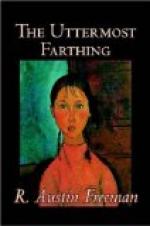This, however, is only an obiter dictum from which many will no doubt dissent.
IV
THE GIFTS OF CHANCE
The testamentary arrangements of eccentric people must, from time to time, have put their legatees in possession of some very queer property. I call to mind an old gentleman who bequeathed to a distant relative the products of a lifetime of indiscrimate collecting; which products included an obsolete field gun, a stuffed camel, a collection of bottled tapeworms, a fire engine, a church pulpit and the internal fittings of a public-house bar. And other instances could be quoted. But surely no legatee ever found himself in possession of a queerer legacy than that which my poor friend Challoner had bequeathed to me when he made over to me the mortal remains of some two dozen deceased criminals.
The bequest would have been an odd one under any circumstances, but what made it much more so was the strange intimacy that became established between me and the deceased. To the ordinary observer a skeleton in a museum case or in an art school conveys no vivid sense of humanity. That this bony shape was once an actual person, a Me, that walked abroad and wore clothes, that loved and hated, sorrowed and rejoiced, that had friends and lovers, parents and perhaps children; that was, in short, a living man or woman, occurs to him but vaguely. The thing is an osteological specimen; a mere anatomical abstraction.
Now these skeletons of Challoner’s were quite different. Walking down the long room and looking into the great wall-case, I was confronted with actual individuals. Number One was Jimmy Archer, who had tried to steal the “blimy teapot.” Number Three was the burglar Fred; I could tell him by the notch on his fifth rib that his comrade’s bullet had made. Number Two was the man who had fired that shot, and Number Four was Joe, who was “done in in the dark.” I knew them all. The weird “Museum Archives” had told me all about them; and as to the rest of that grisly company, strangers to me as yet, the neatly written, Russia-bound volume that Challoner had left would give me their histories too.
It was some days before I was able to resume my reading of the uncanny little book, but an unoccupied evening at length gave me the opportunity. As ten o’clock struck, I put on my slippers, adjusted the light, drew an armchair up to my study fire and opened the volume at the place marked by the envelope that I had inserted at the end of the last reading. The page was headed “Circumstances attending the acquirement of Numbers Five and Six,” and the account ran as follows:




